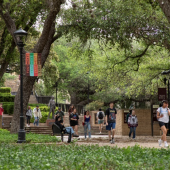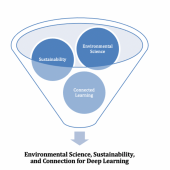
Abstract: The concept of sustainability has been gaining increasing attention worldwide, especially over the last 30 years. To foster sustainable development, education plays a crucial role. Higher education institutions have assumed the leading role in sustainability education and advocating sustainability. However, the literature that evaluates sustainability initiatives at higher education institutions is still fragmented and sparse, with existing studies often focusing on certain aspects of the sustainability initiatives. We designed a questionnaire that covers a broad spectrum of sustainability measures in the operation, curriculum, research, and outreach, which allowed us to investigate the perceived importance of those sustainability initiatives from the perspective of university community members including undergraduate students, graduate students, faculty, and staff at Texas State University in San Marcos. Our results indicated that the Texas State University campus community believes that the themes of Waste Management, Buildings & Infrastructure, and Water Use & Management were the most important themes. The campus community believed that Transportation and Academics are the least important themes. We also identified a set of action items under each theme the most and least important.
Continue Reading
This comparative case study of teaching and learning experience explores connected learning design principles to improve engagement in higher education and weave sustainability practice into introductory environmental science curriculum through the integration of community, place, peer support, networking, and technology. For this study teaching and learning took place in multiple settings, online and in a brick-and-mortar classroom, and in students’ communities. We set out to ask: In what ways might the implementation of connected learning principles be used to improve engagement and weave sustainability into environmental science curriculum, broaden interest in science literacy, and encourage community action in introductory higher education courses? Comparative analysis and collaborative autoethnography methodologies were utilized to compare professor experiences for analysis and synthesis of patterns. Findings suggest that connected learning curriculum can broaden access to science, improve engagement, and help weave sustainability into a variety of courses by presenting students with relevant applied opportunities, connections and critical thinking about place and community, peer support and intergenerational connections, networking, and technology. Students can also gain a sense of agency and career relevance especially important to students who might otherwise feel they cannot “do science” or make a difference in a changing world. Lastly, this approach can improve instructors’ teaching experiences by relieving time and content constraints to incorporating sustainability into other course subjects as students submit more interesting passion-driven work, and are encouraged to network with and learn from individuals (family, community, and scientists) outside the classroom they may not have otherwise sought out.
Continue Reading